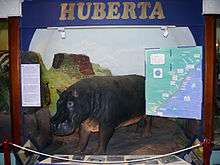Huberta (hippopotamus)

Huberta (initially named Hubert; the gender was discovered after death) was a hippopotamus and one of the most famous animals in South African history.[1]
In November 1928, Huberta left her waterhole in the St. Lucia Estuary in Zululand and set off on the 1600 km (1000 mi) journey to the Eastern Cape, a journey which took her three years. In that time, Huberta became a minor celebrity in South Africa and attracted crowds wherever she went. She was initially thought to be a male and was nicknamed Hubert by the press. The first report in the press was on 23 November 1928 in the Natal Mercury and reported the appearance of a hippo in Natal. The report was accompanied by the only photograph of Huberta in life.[1]
She stopped for a while at the mouth of the Mhlanga River in Natal and a failed attempt was made to capture her and put her in Johannesburg Zoo. After this, she headed south to Durban where she visited a beach and a country club.
Moving on to the Umgeni River, she became revered by Zulus and Xhosas alike.
Finally, she arrived in East London in March 1931. Despite her having been declared Royal Game (and thus protected) by the Natal Provincial Council, she was shot by hunters a month later.
After a public outcry, the hunters were arrested and fined £25. Huberta's body was recovered and sent to a taxidermist in London. Upon her return to South Africa in 1932, she was greeted by 20,000 people and was displayed at the Amathole Museum (earlier known as the Kaffrarian Museum) in King William's Town.
Huberta is the subject of the children's book Hubert The Traveling Hippopotamus by Edmund Lindop and illustrated by Jane Carlson. The book was published in 1961 by Little, Brown and Company.[2]
References
External links
- Hippo page; more info and pictures
- Amathole Museum
- Wild Coast website
- Zululand website
- Municipality of East London website